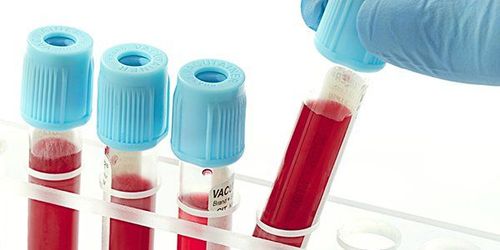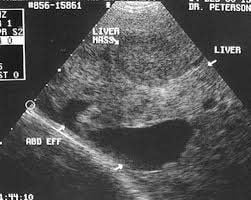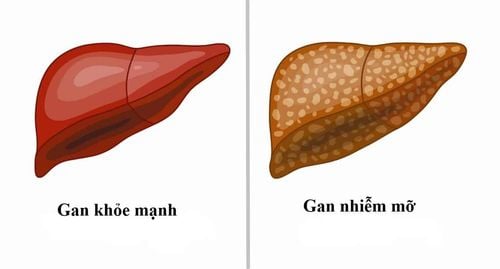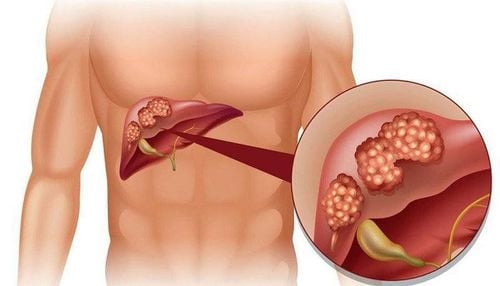This is an automatically translated article.
The article was professionally consulted by a Gastroenterologist, Department of Medical Examination & Internal Medicine - Vinmec Hai Phong International General Hospital.The most common step of screening for cancers is the clinical examination. This is the first step and also plays an important role in cancer screening. During the physical exam, the doctor will look for abnormal lymph nodes and tumors on the body and assess the risk of cancer based on age, sex, family history, health status. , job.
1. Diagnostic Imaging
Liver ultrasound is a common imaging method for liver cancer screening today, with a sensitivity of about 68-87%. Currently, liver cancer is often detected thanks to imaging methods such as ultrasound. Ultrasonography is simple, cost-effective, harmless and can diagnose tumors >1cm. Ultrasound also helps detect comorbidities such as cirrhosis, or portal hypertension.
In the early stages of the disease, patients usually will not have specific liver cancer symptoms. Through imaging, the extent of damage to liver surface structures can be assessed. A combination of liver ultrasound and blood AFP measurements is more optimal than performing these tests alone as part of a liver cancer screening protocol.

Siêu âm gan là một phương pháp chẩn đoán hình ảnh tầm soát ung thư gan phổ biến hiện nay
2. Liver biopsy
Liver biopsy should only be indicated when absolutely necessary because the biopsy also has certain risks: infection, bleeding, spreading cancer cells along the path of the biopsy needle (1 - 3% of cases). fit). A positive hepatocyte biopsy results in a definitive diagnosis of liver cancer. If the biopsy is negative, we recommend re-examination with imaging studies, even re-biopsy after 2-3 months.
3. High-resolution tomography and magnetic resonance imaging
This is a liver cancer screening test to detect tumors as small as 1cm. High-resolution tomography and contrast-enhanced magnetic resonance imaging for liver cancer diagnosis and tumor staging; Liver biopsy helps to differentiate between benign and malignant tumors.
However, if other screening tests for liver cancer are not clear, a liver biopsy is needed;
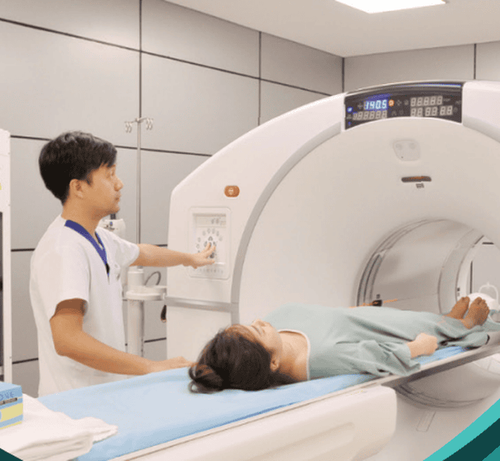
Chụp cắt lớp phân giải cao giúp chẩn đoán nhiều bệnh về gan
4. Laparoscopy
Laparoscopy with a small incision in the abdomen helps to detect small tumors, detect cirrhosis or take liver tissue samples for biopsy.
5. Liver cancer screening test
5.1. AFP Alpha-fetoprotein (AFP), is a protein secreted by the immature liver cells of the fetus. AFP may be elevated in 70% of liver cancer patients but may also be normal.
If AFP is high, it is a big suspicion for liver cancer. However, AFP may be elevated in cirrhosis and chronic hepatitis. Most people who have been found to have high AFP in their blood are in the later stages of the disease.
5.2. AFP-L3 Is an isoform of AFP. The three forms of AFP are distinguished by the degree of fucosylation (fucosylation) of the sugar chain attached to N-acetylglucosamine. These forms are able to bind to Lens culinaris agglutinin (LCA) with different affinities.
AFP-L1 is a non-LCA-binding form, is the predominant form seen in people with benign liver disease such as chronic hepatitis B or cirrhosis AFP-L2 is able to bind LCA with moderate affinity and is the predominant form. produced by yolk sac tumors. AFP-L3 is produced by malignant hepatocytes, binds with high affinity to Lens culinaris agglutinin (LCA) and is the predominant form seen in patients with HCC. AFP-L3 was recorded as the percentage of AFP-L3 relative to the total AFP level. The cutoff value of AFP-L3 was determined to be 10%, then the test has a sensitivity of 56% and a specificity of 90% in detecting HCC. People with AFP-L3 values higher than 10% had a 7-fold increased risk of developing HCC within 21 months.
5.3. DCP or PIVKA II is an abnormal form produced by a lack of vitamin K in prothrombin, a clotting factor produced by the liver. DCP can be produced by liver tumors and levels are often increased with HCC. Many studies have shown that an increase in DCP often reflects disease status, tumor size, and portal vein invasion. In addition, after surgery to remove the tumor or after treatment for liver cancer by other methods, DCP levels decrease rapidly. The return of DCP after treatment represents disease recurrence or treatment failure.
In addition, to accurately determine the status of liver cancer, you can perform more liver function tests to evaluate the cause of the disease and some other tests.
6. Address for liver cancer screening

Bệnh viện Vinmec hiện đang triển khai các Gói khám tầm soát và phát hiện sớm ung thư gan phù hợp với nhiều đối tượng
Periodic liver cancer screening is one of the ways to detect the disease early, even when there are no symptoms. Where to screen for liver cancer to give accurate results is a matter of concern for many people.
Currently, Vinmec International General Hospital is implementing Packages for screening and early detection of liver cancer suitable for many subjects at risk of different diseases, including the package of liver cancer screening - developing liver cancer. Early detection of cancer without any symptoms. When registering for the package of screening and early detection of liver cancer, customers will receive:
Examination and consultation with an oncologist through an oncology appointment. Peripheral blood cell analysis. Assess liver function through tests such as measuring ALT activity (GPT), measuring AST activity (GOT), measuring GGT activity (Gama Glutamyl Transferase), measuring total Bilirubin. Screening for hepatitis B and C virus infection through rapid HBsAg test and automatic immunological HCV Ab test. Screening for liver cancer through the quantitative test of AFP (Alpha Fetoproteine). Screening for liver tumors by abdominal ultrasound (general). Currently, Vinmec International General Hospital is one of the medical facilities with a team of medical experts in the field of oncology, the most modern machinery and equipment in the region. Those will be good conditions to help the screening for early detection of liver cancer be quick, convenient and time-saving. As a result, it is possible to screen for liver cancer, helping to detect liver cancer at an early stage so that appropriate and timely treatment measures can be taken.
Please dial HOTLINE for more information or register for an appointment HERE. Download MyVinmec app to make appointments faster and to manage your bookings easily.





